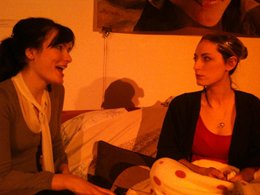The opening of Rawlife’s new production of Amy Rosenthal’s 1999 play Henna Night, immediately draws the audience’s attention to the act of listening. The play begins in darkness, forcing the audience to listen rather than merely hear. As the heartbroken Judith (Rachel Logan) leaves a message on the answering-machine of her ex-boyfriend, Jack, her ambiguous cry for help is in fact answered by his new girlfriend Ros (Colette Lennon). When Ros turns up at Judith’s flat each woman is forced to listen to the other’s story, a process that provides both with a catharsis of sorts.
 With the simple use of a couch and table in the small performance area, Martin McSharry’s direction brings many of the central themes of the text to the fore. Although old photos strewn across the stage may feel somewhat clichéd, the cluttered nature of the space is in stark contrast to the painting that hangs above the couch. The picture of a girl’s profile framed by a window suggests both escape and captivity, and can be read in terms of the character Judith. Her mind is cluttered by heartbreak and her past relationship; if she adjusted her perspective slightly she might see a way out of it all.
With the simple use of a couch and table in the small performance area, Martin McSharry’s direction brings many of the central themes of the text to the fore. Although old photos strewn across the stage may feel somewhat clichéd, the cluttered nature of the space is in stark contrast to the painting that hangs above the couch. The picture of a girl’s profile framed by a window suggests both escape and captivity, and can be read in terms of the character Judith. Her mind is cluttered by heartbreak and her past relationship; if she adjusted her perspective slightly she might see a way out of it all.
Logan and Lennon do well to create a tense atmosphere and Logan is good in her role as the victim, Judith. Although she wants to have this confrontation with Ros, she spends most of her time hugging the wall as if she’d also like to be on the other side of it, hiding away from the world. In contrast to the dishevelled Judith, Lennon as Ros looks every bit the perfect school teacher in her white top and grey trousers.
Although there are some witty one-liners and many home truths in the play, under McSharry’s direction, there are problems with the pacing of the production and the delivery of lines. At times, the angst-ridden tones of Ros become slightly monotonous and it is difficult to identify any clear character trajectory. Despite some well-executed moments of tenderness - as Ros slowly, delicately and carefully washes the henna from Judith’s hair, a definite atmosphere of calm is constructed in opposition to the tension that opened the play - as another Coldplay song brings the performance to an end, it’s clear that this production represents the self-indulgent side of heartbreak in an overly sentimental fashion.
Pádraic Whyte is a Visiting Research Fellow at the Institute of Irish Studies, Queen’s University Belfast.